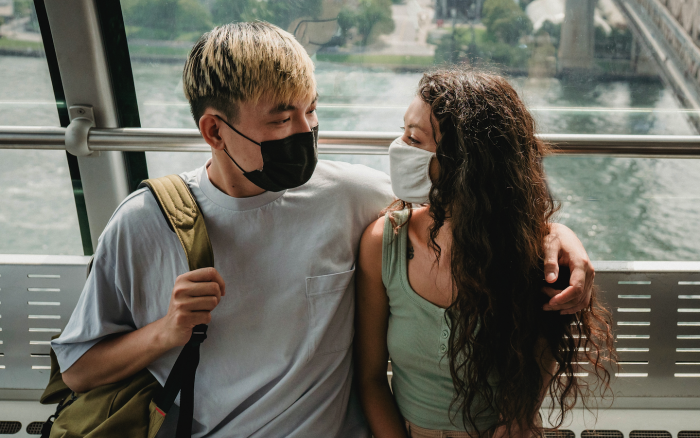Have opinions or thoughts about this article? Join the conversation by commenting below or sharing your own view here.
We’ve all heard the “live and let live” philosophy.
And for those of you who were around for Paul McCartney’s era, you’ll recognize his (slightly different!) “Live and Let Die” song, written with his wife Linda for the James Bond film of the same name.
For those of you who were into the hair bands of the 80s and 90s, you’ll recognize this song as sung by Guns N’ Roses, for which they won a Grammy nomination in 1993.
I’m sure it’s been done by numerous other groups or artists since that time, but those details aren’t important here.
The lyrics are simple, which makes sense, really, given that it took them reportedly 10 minutes to write:
“When you were young, and your heart was an open book, you used to say live and let live…
But if this ever-changin’ world in which we’re livin’ makes you give in and cry, say live and let die. Live and let die.”
It speaks to an initially naïve mindset and then a burgeoning disillusionment of how we see the world, ending with a decision to live our own lives and let others live theirs—even if their choices will ultimately kill them. Or at least that’s one way of interpreting it.
Sound familiar?
This concept has never been more pertinent, particularly when applied to the sharp disagreement between persons all over America on the utility of wearing masks.
There appear to be two distinct categories:
>> The non-mask wearers, who, by and large, report they’re afraid the government is trying to exert more and more control, and the mask mandates are just an alarming harbinger of uber-secret plans to take over and control everything about a person.
>> The mask-wearers who “follow the science” and shame others who don’t wear masks, saying they’re psychopaths who care for no one but themselves.
Of course, there’s a third category—those who actually medically can’t wear masks, like a lady I met who looked totally normal but who had one lung which was diseased and meant she never got enough oxygen. Or the man who also looked totally normal but had a rare, life-threatening lung disease with the same type of result.
It was unbelievable that all the people who felt it was their right to come up and say really mean nasty things and accuse them of all sorts of moral deficiencies, based on stories they made up about why these people weren’t wearing masks.
Had they known the truth, I’d venture to guess they’d have walked right on by, perhaps even felt a smidge of sympathy for those so afflicted. Maybe even been glad it wasn’t them. But that’s just a story I’m making up…
This isn’t an article about whether one should or should not wear a mask.
It’s a look at the psychology behind those decisions. It’s meant to make us think about our choices in this area and how we’ve judged others for theirs.
I’ve talked to a number of people who promote a “live without fear” mindset, but they also say they won’t wear masks because the government is trying to control them. I always feel a little confused at this point and think, “How is that not a fear-based decision?”
I’ve heard the old, “The government can’t tell me what to put on my body,” which is just laughable. We all wear clothes out in public, and we’re required to wear a seatbelt in a car, in some states, a helmet on our heads when we’re riding a motorcycle, shoes in stores, and numerous other examples.
So let’s not pretend it’s about that because no one’s raising a fuss about those sorts of things. (In case you’re wondering, I’m not exactly a fan of some of those laws, but there you have it.)
If decisions are being made based on the worry of being controlled by the government, I hate to break it to you: you’re living in fear.
Unless someone from the government is knocking on my door right now with an effective means of making me a robot, my fear of government control is a story.
What I do see are people who have authority issues making up stories, so they don’t have to do what they’re told. And, on the surface, that’s fine, but at least call it what it is.
I’ve had people say, “To me, wearing a mask is a moral issue.” I had to think about that for a while and decided that maybe we just don’t have the same definition of “moral” since my definition coincides with those found in dictionaries and states that “moral” is:
“Concerned with the principles of right and wrong behavior and the goodness or badness of human character.”
The act of putting on and wearing a mask is neither inherently right or wrong nor does it affect someone’s character negatively or positively. No one blew their top when The Incredibles put on their masks and went out to take care of business because that fairly insignificant action simply doesn’t register as being morally right or wrong.
If they’d taken off all their clothes before going out and taking care of business, the reaction would have been much different since, culturally, Americans believe that public nudity is indeed a morally unacceptable deed.
The reason why someone chooses to wear a mask might be moving somewhat closer to a moral issue since it fits in with another part of the definition that says a moral issue is:
“A person’s standards of behavior or beliefs about what is and is not acceptable for them to do.”
The story each of us make up (i.e., our beliefs) about why we should or shouldn’t wear a mask is the key here.
If I’m afraid the government is trying to control me (a story I’ve made up—no one’s knocking down my door exerting whatever control I fear in the here and now), I might decide not to wear a mask as a means of publicizing my resistance to my perceived idea that the government has some super-secret plan to ultimately take away all my human rights.
I might even hope that my actions will inspire others to do the same, but the truth is that all humans will never think the same. If I’m holding out for the “if everyone would just resist,” then I’ve got some big-time magical thinking going on, and I haven’t taken the time to understand much about how humans operate psychologically.
I could even go out and get a medical exemption from some sketchy place online and tell people, “I can’t wear a mask,” which isn’t true since, physically, I can indeed wear a mask and not die.
But is that morally acceptable, or even desirable? I mean—I’m lying! That directly affects my character in a decidedly negative manner, and I haven’t met a person yet who actually liked and trusted a known liar.
Maybe I decide I should indeed wear a mask, for one or more of several reasons—the government mandated it, I believe what I’ve heard via the media that it will protect me and protect others.
Why in the world wouldn’t we all want to protect ourselves and each other? In fact, it’s downright morally disgraceful the way those anti-maskers are behaving!
Have they no concern for anyone but themselves?
That’s a funny question when I think about it. If I believe that they’re only concerned for themselves, why wouldn’t they be wearing masks for that reason if none other?
When this question is taken to its logical conclusion, non-mask wearers must not believe that the mask is actually effective if they’re not wearing one for themselves because humans are inherently selfish to at least some extent. We all generally err on the “more selfish” end of the spectrum when it comes to matters of living and dying.
This means their decision is actually not about me (“they don’t care whether I live or die!”) or anyone else at all. If they truly believe the mask isn’t doing (and can’t do) what it’s been touted to do in the media, then they’d feel pretty silly going around wearing one when they’re convinced it’s all a bunch of hooey.
All I’ve managed to accomplish is to take their choice personally, get all angry and anxious about it, then blame them and make up a story about why they’re doing what they’re doing. I’m going to go out on a limb here and observe that these actions on my part haven’t helped anyone, least of all me.
If I’m wearing a mask because it’s government-mandated, that’s cool. At least we can say that I don’t have a lot of criminal or antisocial thinking going on and that I try to follow the rules.
If I’m wearing it because I truly believe it will protect others, then that’s also cool. I’ve got some great social responsibility and love of my fellow man going on, and who’s gonna throw down on that?
I realize I haven’t gone over all the beliefs that have been bandied about everyone on both sides of this coin, but this isn’t about the “rightness” or “wrongness” of each person’s beliefs. It’s about achieving some sense of understanding when someone makes a different choice than I do.
We’ve all had numerous examples via the media on immediately making up stories, then judging and shaming others based on that story over the last year, and I dare say that most of us have followed suit to varying degrees. This just means that most of us have at least proved the “monkey see, monkey do” philosophy with great abandon. I’m just not sure how much of an accomplishment that really is…
The point of all this is that what I make up about any person or situation is just a story. The definition of “story,” as it’s used in this article, is:
“Anything I tell myself about what could happen, but it’s not actually happening right now.”
If it’s not happening right this moment, it’s a story. And, making up stories that cause us fear and anxiety isn’t a particularly productive way of spending our time.
We all do it, but those wise humans who are trying to be aware of when they do it and then stop it—those are the ones we see who have not been terribly impacted mentally in a negative way over the last year.
They haven’t been afraid of being controlled, they aren’t afraid of dying, and they’re willing to wear a mask when it’s required, despite whatever they believe about the actual efficacy of doing so.
They’re the “live and let die” folks, not mad at people who wear masks and not mad at those who don’t.
They may walk a good distance around someone who is not wearing a mask, or they may go up and say, “It’s great to see your smile,” but either way, they take their own precautions as they see fit—and let others do the same, with no blame, no shame.
That makes for a peaceful existence.
And I must say, it’s those folks I’m trying to emulate.
~
 Share on bsky
Share on bsky




Read 0 comments and reply